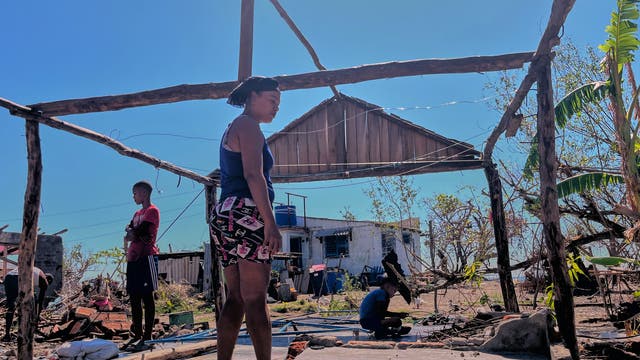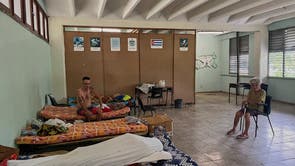- News
Thousands of Cubans remain without power, water or proper shelter almost a month after Hurricane Melissa pummeled the island’s eastern region as one of the strongest Atlantic storms in history
Y. Milexsy Durn,Ariel FernndezWednesday 26 November 2025 05:10 GMTThousands of Cubans struggle without power and water nearly a month after Hurricane Melissa
Show all 3



For free real time breaking news alerts sent straight to your inbox sign up to our breaking news emails
Sign up to our free breaking news emails
Sign up to our free breaking news emails
 Email*SIGN UP
Email*SIGN UPI would like to be emailed about offers, events and updates from The Independent. Read our Privacy notice
Thousands of Cubans remain without power, water or proper shelter almost a month after Hurricane Melissa pummeled the island’s eastern region as one of the strongest Atlantic storms in history.
By day, families walk toward the nearest river to fill plastic containers with water and by night, they squeeze together to sleep under temporary shelters and tents.
“We lost everything in the flood,” 80-year-old Lucía García said. “I am very depressed and very sad here.”
García is living in a small classroom with her two sons, ages 45 and 55, and her ailing 81-year-old husband, who remains bedridden.
The school where they’re staying in the town of Río Cauto serves as a shelter for 14 families and is providing daily meals to them and 25 other families living with relatives and neighbors. Water delivery trucks pass by every three or four days.
Many of the town’s residents lived by the river and lost their homes after Melissa cut through eastern Cuba, forcing nearby dams to release huge amounts of water.
More than 2,300 people were evacuated from the Río Cauto area, with more than 750 staying in private homes, according to a Nov. 10 report published in the official newspaper, Granma. It claimed that the return of residents to their homes “has been completed.”
Major damage also was reported in the nearby town of Los Mangos, where residents said massive floods hit a day after the storm made landfall.
“By dawn, the entire village was underwater,” recalled Anisleydis Hidalgo.
“We were evacuated before the hurricane hit,” she said. “When we returned home, they came to tell us there would be flooding…but no one expected the water to reach the level it did.”
She is living in a military-style tent with her 5-year-old daughter and two other families.
Lianet Socarras, a social worker from Los Mangos, said that 58 people, including 30 children, are sharing 10 tents donated by the government of India.
“The most critical problem we have now is the supply of drinking water in the community,” she said, noting that there is none.
‘The sea came into my house’
Soaked mattresses, electrical appliances, clothing, food, furniture and other belongings remain scattered outside the homes, with the smell of decaying carcasses of animals killed during the storm hanging over the town.
Neither the hurricane nor the floods damaged the electrical system in Los Mangos, but scheduled power outages have lasted many hours, further exacerbating an already difficult situation.
In the southern coastal municipality of Guamá, several towns are still reeling from the storm.
“The sea came into my house and soaked mattresses, electrical appliances and everything else that was there,” said Altagracia Fonseca, a 65-year-old retiree.
On a recent day, she walked to a nearby river to wash some of the clothes she was able to salvage after the storm.
Before Melissa hit, she had evacuated and packed only two changes of clothes, a toothbrush, toothpaste and a towel.
“I packed things like someone would when they are going to be away from home for a day,” she said as she burst into tears. “I never imagined I would find my house in such a state of disrepair. It was sad, very painful.”
Elizandra Sorrilla was in a similar situation.
“I packed clothes for myself and my children in a backpack; that’s all we have,” she said. “It’s something none of us will ever forget.”
Sorrilla, along with her husband, two children, and their dog, Roki, are living out of a small grocery store where they have improvised a kitchen and a space that serves as both bedroom and living room.
“They tell us they’re going to help us, but the resources haven’t arrived yet,” Sorrilla said.
Patience is running out
Power outages are constant in Guamá, and officials from the National Electric Union warned that repairs could take until mid-December.
But patience is running out.
Residents in the town of El Carmen recently blocked a main highway with fallen trees and electrical posts, noting they had been without electricity —even before Melissa hit.
“Everyone wants electricity, and we are working tirelessly to achieve this,” said Alfredo López, director general of the National Electric Union, in a heated discussion with residents in the middle of the blocked road.
While food, mattresses, roof tiles and other items are being distributed to those affected by the storm, many needs are still going unmet as relations between Cuba and the U.S. are at their most tense since U.S. President Donald Trump and Secretary of State Marco Rubio took office.
They have implemented a radical tightening of sanctions against the island that were imposed more than six decades ago to pressure it to change its economic model.
No storm-related deaths were reported in Cuba, where authorities evacuated more than 700,000 people from coastal areas.
The U.N. said that some 53,000 people in Cuba have been unable to return to their homes, including 7,500 living in official shelters.
Melissa also made landfall in Jamaica, where at least 45 deaths were reported, and its outer bands swiped Haiti, where at least 43 people were killed.
____
Follow AP’s coverage of Latin America and the Caribbean at https://apnews.com/hub/latin-america




